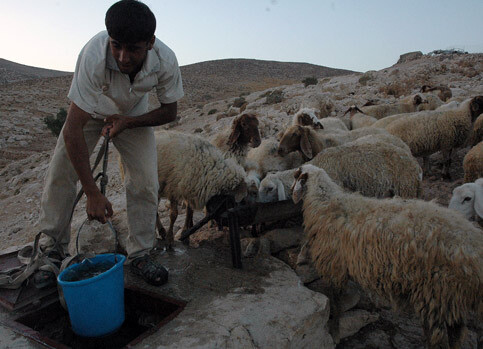IRIN 2 October 2006

Not enough to go around: A sheepherder draws water from a cistern for his goats (Edward Parsons/IRIN)
GAZA CITY - Environmentalists and public health specialists are warning of escalating health problems due to a growing freshwater deficit and declining water quality in the Gaza Strip.
Nahed Abu Dayyia, an ecologist with the Palestinian Water Authority (PWA), says water pollution in Gaza is primarily caused by high salinity and high nitrate concentrations in groundwater.
The Gaza Strip, bordering Israel and Egypt, has a population of more than 1.4 million, one of the most densely populated areas in the world.
“Insufficient sanitation conditions and the absence of sewage conveyance systems pose serious threats to public health and are the major causes of environmental degradation,” Dayyia said.
Dr Akram Hallak, a water expert and lecturer at Al-Aqsa University, agrees that the water situation in Gaza Strip is bad, both in quantity and quality. He told IRIN the amount of pumped water from artesian water wells in the Strip is not sufficient to meet the needs of the population.
“Although the amount of pumped water is about 50 million cubic metres per year, around 30 percent is lost because of the worn-out and destroyed sewage systems. It provides about 100 litres of water a day for domestic use per person, while according to the WHO [World Health Organisation] the amount of water per capita should be 250 litres a day.”
This means severe water shortages for at least 70 percent of Gazans. In addition, Hallak says Gaza’s water is low quality, containing sodium, nitrates and chlorides that exceed percentages recommended as safe for human consumption by the WHO.
This is a health risk, he says, contributing to kidney problems, blood poisoning and conditions affecting pregnant women. He added that nitrate concentrations in water cause methemoglobinemia or ‘blue baby’ syndrome, which arises when large amounts of nitrates are ingested. Symptoms include headache, weakness, dizziness, and can progress to seizures, coma and death. High nitrate concentrations also cause gastric cancer and reduce vitamin C intake among infants.
According to the PWA, Gaza water has nitrate levels that are double the acceptable WHO standard, while chloride levels are four times the recommended levels.
Groundwater, which depends on rainfall, is a major source of water in the Gaza Strip. Nahed says the quantity of fresh water available has been severely reduced because new tarmac roads are preventing rainwater from filtering through sand to replenish groundwater levels.
“With a growing population expected to exceed 2.3 million by mid-2010, there will be over 5,800 people per square km. As a result, the water deficit will be exacerbated if more water and resource infrastructure are not put in place within the few next years,” said Rebhi al-Sheikh, deputy chairman of the PWA.
Average annual rainfall has more than halved from 90 million cubic metres in the 1970s to 40 million cubic metres today. In addition, Israeli wells dug all around the Gaza Strip compound the problem, Nahed said.
Israelis, however, contest this. Uri Schor, spokesperson for the Israeli Water Commission, said Gazans had pumped too much water out of the Gaza aquifer, with the result that sea water had seeped in and turned the fresh water salty. “When Israeli settlers were in Gaza, they pumped some water from the ground, but they also were supplied with water from Israel. Even if all the settlers had only pumped water from the ground, it would not have made an impact on the Gaza Aquifer,” Schor told IRIN.
“We have offered them 20 million cubic metres a year of water from our Ashkelon desalination plant. The Palestinian water people think it’s a good offer but the Palestinian politicians don’t want it,” he added.
Al-Sheikh said Israel recognised Palestinian water rights in the September 1995 Taba Interim Agreement (Oslo II), including the delivery of 5 million cubic metres of water to the Gaza Strip each year. The offer was not implemented then though, because Israel was not technically ready.
“A year ago, Israel offered to provide us with water from the Ashkelon desalination plant,” Al-Sheikh said. “When we asked about the price of water, they [the Israelis] demanded 3 shekels [US 69 cents] for each cubic metre, which we find too costly. Even when we asked about the quality of water, they only said it was drinking water. In Oslo II, we agreed upon buying freshwater not water from desalination plants. This contradicts with what we had agreed in the Taba agreement.”
This item comes to you via IRIN, a UN humanitarian news and information service, but may not necessarily reflect the views of the United Nations or its agencies. All IRIN material may be reposted or reprinted free-of-charge; refer to the copyright page for conditions of use. IRIN is a project of the UN Office for the Coordination of Humanitarian Affairs.